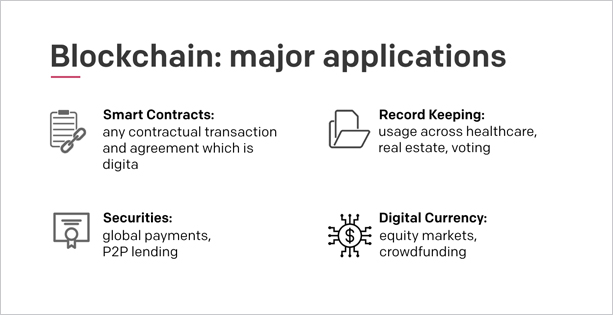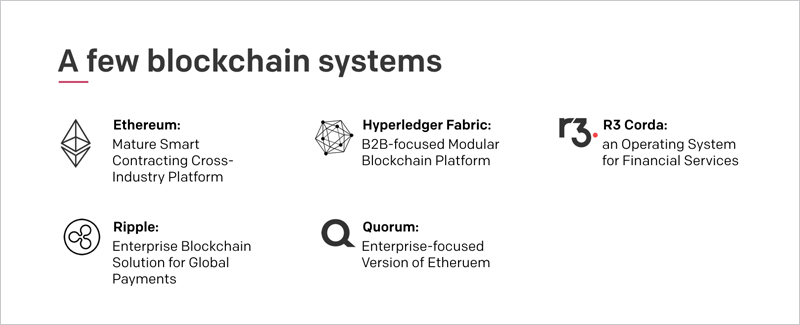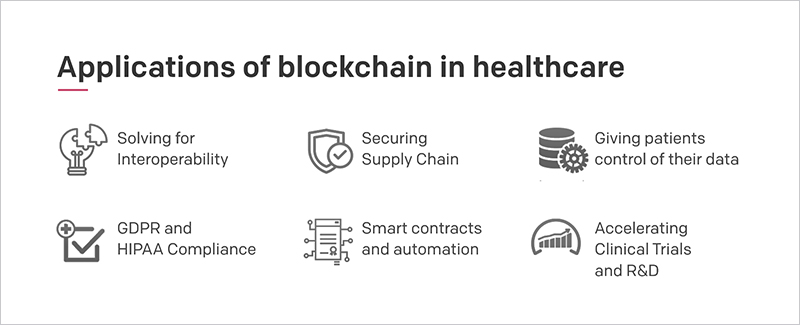For the last 10 years or so, blockchain technology has gained great visibility and ‘buzz’ in media. Originally meant to serve as the underlying technology for the cryptocurrency Bitcoin, it has been portrayed as a panacea for many industries or at least as a ‘must-have’ for enterprises. Aside from the hype, it has received its share of ridicule too from different quarters. So what is the reality? What are the use case of blockchain across industries? Let’s start with the basics:
What is blockchain?
Blockchain is a universally distributed open ledger system. It comprises a sequential list which records every transaction that has ever occurred in a process. A blockchain is made up of many blocks containing user transactions – and each block points to the previous block. The process of adding new blocks is called mining – a concept made popular in the context of Bitcoin, the crypto currency system. It needs to be clarified that blockchain is not bitcoin – the technology behind the latter is blockchain. Interestingly, blockchain is referred to as a meta technology as it impacts other technologies. Over the years many blockchain systems have been developed: Ethereum, Hyperledger Fabric and Ripple to name a few.
Some of the hallmarks of blockchain which play a role in its acceptance include:
- Distributed trust
- Chronological nature and time stamp
- Immutability
- Cryptographic seal
Blockchain: impact beyond finance
The popular perception is that blockchain technology is utilized only by the finance industry. However, the basic nature of the technology makes it suitable for usage across domains.
The blockchain is an incorruptible digital ledger of economic transactions that can be programmed to record not just financial transactions but virtually everything of value.
~ Don & Alex Tapscott, authors Blockchain Revolution (2016).
A few major applications of blockchain include:

- Smart Contracts: any contractual transaction and agreement which is digital
- Record Keeping: usage across healthcare, real estate, voting
- Securities: global payments, P2P lending
- Digital Currency: equity markets, crowdfunding
There are several types of blockchain systems including:

- Ethereum: Mature Smart Contracting Cross-Industry Platform
- Hyperledger Fabric: B2B-focused Modular Blockchain Platform
- R3 Corda: an Operating System for Financial Services
- Ripple: Enterprise Blockchain Solution for Global Payments
- Quorum: Enterprise-focused Version of Etheruem
Let’s look at some use cases across select domains:
Retail
Blockchains can help retailers that offer gift cards and loyalty programs make those systems cheaper and more secure. Gyft, an online platform for buying, sending and redeeming gift cards that is owned by First Data, has partnered with blockchain infrastructure provider Chain to run gift cards for thousands of small businesses on the blockchain — the new program is called Gyft Block.
Travel
Singapore Airlines launched KrisPay – a digital blockchain wallet that allows frequent fliers to convert air-miles into digital currency. It will enable travelers to spend their air miles at retail establishments, hotels, petrol stations and other partner merchants.
Logistics
Moving freight is a complex process involving different parties with different priorities. An IoT enabled blockchain can store the temperatures, position, arrival times, and status of shipping containers as they move through the system. Indelible blockchain transactions ensure that all parties can trust the data and take action to move the product quickly and efficiently.
Banking
Majority of banking systems are built on a centralized database, which makes them more susceptible to attacks as all information is stored locally in one place. Also, many banking systems are outdated and are, therefore, more vulnerable to new forms of cyber-attacks. With banking systems built on top of blockchain technology chances of fraud and data theft can be reduced as the distributed ledger technology encrypts and verifies every single bit of data in a transaction.
Automobile Industry
Volkswagen AG is testing three concrete potential applications for distributed ledger technology: mileage clocking system, protecting cars from hackers (for Porsche) and streamlining business contact between providers and customers of electric charging stations.
Real Estate
Blockchain can play a role in buying property to conducting due diligence to enabling crowd-sourced investments. For example, Hilton Worldwide has begun using a blockchain-based property management system. The Dubai Land Department authority used blockchain in Ownership verification, property sale by the developer and smart leasing process.
While Blockchain has use cases across domains its use in Digital Health, Pharma & Life Sciences can perhaps be the most impactful. Currently the healthcare industry faces three major challenges in data collection, data accessibility and data privacy. To illustrate, counterfeit drugs is a major problem in the healthcare industry: 10% to 30% of the drugs sold in developing countries are counterfeit. WHO estimates that 16% of counterfeit drugs contain the wrong ingredients, while 17% contain the wrong levels of necessary ingredients. Blockchain technology can play a role in drug traceability as the manufacturer produces the drug and marks it with a unique code after which a hash is produced. According to a definition, hashing is the process of taking an input of any length and turning it into a cryptographic fixed output through a mathematical algorithm. Various subsequent steps between the wholesaler, pharmacist and the patient are then added to the blockchain.
Applications of blockchain in healthcare include:

- Solving for Interoperability
- Securing supply chain
- Giving patients control of their data
- GDPR and HIPAA compliance
- Smart contracts and automation
- Accelerating clinical trials and R&D
Clinical trials have data management issues leading to inefficiencies in time management. Blockchain can solve such issues by standardizing data sharing. Robosoft’s Blockchain Solution utilizing distributed ledger scripted smart contracts based on Hyperledger Fabric offers guaranteed anonymity required for PHI, fully audited verification of data and more.
As a Top App Development Companies for enterprises, we truly appreciate the role of emerging technologies in crafting digital experiences. Among emerging technologies which have the potential to deeply impact the digital experience and the process behind it, blockchain seems to garner great share of voice. Connect with us to discover how blockchain can play a role in your enterprise.





